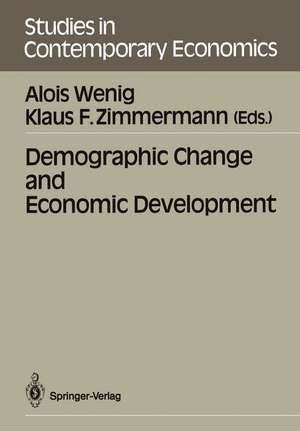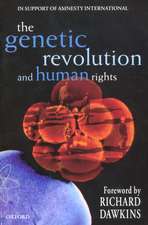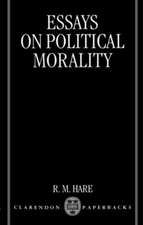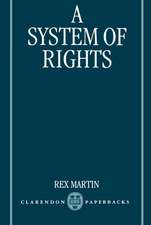Demographic Change and Economic Development: Studies in Contemporary Economics
Editat de Alois Wenig, Klaus F. Zimmermannen Limba Engleză Paperback – 26 apr 1989
Din seria Studies in Contemporary Economics
-
 Preț: 309.48 lei
Preț: 309.48 lei -
 Preț: 502.75 lei
Preț: 502.75 lei -
 Preț: 424.81 lei
Preț: 424.81 lei -
 Preț: 490.25 lei
Preț: 490.25 lei - 15%
 Preț: 637.78 lei
Preț: 637.78 lei -
 Preț: 421.72 lei
Preț: 421.72 lei -
 Preț: 501.41 lei
Preț: 501.41 lei -
 Preț: 485.46 lei
Preț: 485.46 lei - 15%
 Preț: 466.13 lei
Preț: 466.13 lei - 15%
 Preț: 647.08 lei
Preț: 647.08 lei - 15%
 Preț: 638.89 lei
Preț: 638.89 lei - 15%
 Preț: 638.89 lei
Preț: 638.89 lei -
 Preț: 490.25 lei
Preț: 490.25 lei -
 Preț: 488.12 lei
Preț: 488.12 lei -
 Preț: 485.24 lei
Preț: 485.24 lei - 15%
 Preț: 441.51 lei
Preț: 441.51 lei -
 Preț: 493.51 lei
Preț: 493.51 lei -
 Preț: 420.20 lei
Preț: 420.20 lei -
 Preț: 383.71 lei
Preț: 383.71 lei - 15%
 Preț: 635.80 lei
Preț: 635.80 lei - 15%
 Preț: 648.42 lei
Preț: 648.42 lei -
 Preț: 487.37 lei
Preț: 487.37 lei -
 Preț: 451.26 lei
Preț: 451.26 lei - 15%
 Preț: 635.15 lei
Preț: 635.15 lei - 20%
 Preț: 557.75 lei
Preț: 557.75 lei - 15%
 Preț: 650.04 lei
Preț: 650.04 lei -
 Preț: 493.34 lei
Preț: 493.34 lei - 15%
 Preț: 634.18 lei
Preț: 634.18 lei -
 Preț: 486.60 lei
Preț: 486.60 lei -
 Preț: 495.46 lei
Preț: 495.46 lei -
 Preț: 485.46 lei
Preț: 485.46 lei -
 Preț: 481.58 lei
Preț: 481.58 lei -
 Preț: 485.61 lei
Preț: 485.61 lei -
 Preț: 418.67 lei
Preț: 418.67 lei -
 Preț: 417.90 lei
Preț: 417.90 lei -
 Preț: 492.74 lei
Preț: 492.74 lei -
 Preț: 488.33 lei
Preț: 488.33 lei -
 Preț: 419.21 lei
Preț: 419.21 lei -
 Preț: 483.12 lei
Preț: 483.12 lei -
 Preț: 486.60 lei
Preț: 486.60 lei -
 Preț: 425.42 lei
Preț: 425.42 lei - 15%
 Preț: 638.57 lei
Preț: 638.57 lei - 15%
 Preț: 637.28 lei
Preț: 637.28 lei -
 Preț: 483.70 lei
Preț: 483.70 lei -
 Preț: 414.21 lei
Preț: 414.21 lei -
 Preț: 428.84 lei
Preț: 428.84 lei - 15%
 Preț: 633.19 lei
Preț: 633.19 lei -
 Preț: 478.71 lei
Preț: 478.71 lei - 15%
 Preț: 639.41 lei
Preț: 639.41 lei
Preț: 644.82 lei
Preț vechi: 758.60 lei
-15% Nou
Puncte Express: 967
Preț estimativ în valută:
123.42€ • 128.36$ • 103.42£
123.42€ • 128.36$ • 103.42£
Carte tipărită la comandă
Livrare economică 14-28 martie
Preluare comenzi: 021 569.72.76
Specificații
ISBN-13: 9783540511403
ISBN-10: 3540511407
Pagini: 340
Ilustrații: XII, 325 p.
Dimensiuni: 170 x 244 x 18 mm
Greutate: 0.54 kg
Ediția:Softcover reprint of the original 1st ed. 1989
Editura: Springer Berlin, Heidelberg
Colecția Springer
Seria Studies in Contemporary Economics
Locul publicării:Berlin, Heidelberg, Germany
ISBN-10: 3540511407
Pagini: 340
Ilustrații: XII, 325 p.
Dimensiuni: 170 x 244 x 18 mm
Greutate: 0.54 kg
Ediția:Softcover reprint of the original 1st ed. 1989
Editura: Springer Berlin, Heidelberg
Colecția Springer
Seria Studies in Contemporary Economics
Locul publicării:Berlin, Heidelberg, Germany
Public țintă
ResearchCuprins
I: Theoretical Studies on Economic Change and Demographic Development.- I,1: Macroeconomic Models.- Malthusian Crises, Boserupian Escapes and Longrun Economic Progress.- Endogenous Fluctuations in the Barro-Becker Theory of Fertility.- Mortality Changes and their Economic Consequences, with Particular Reference to Cause of Death.- I,2 Policy Issues.- Market Failure, Population Growth and Government Intervention in a Life-Cycle Growth Model.- Capital Accumulation and Population Growth in Two Sector Closed and Open Economies.- “Population Drag” and the Role of the International Sector.- I,3 Microeconomic Models.- The Timing of Births: A Theory of Fertility, Family Expenditures and Labour Market Participation Over Time.- Equilibrium and Efficiency in Intergenerational Transfers.- II: Applied Studies on Economic Change and Demographic Development.- II,1: The Case of Hungary: A Historical Perspective.- Economic Change and Family Size in Hungarian Historical Demography.- Demographic Change and Economic Development in Hungary Since the Second World War.- II,2: Issues of Developing Countries.- A Case for Some Simple Analytics of Demographic Change and Economic Development.- Monetary Methods of Estimating Informal Activities in Developing Countries.- Interaction Between Macro-Economic Activities and Demographic Changes in Selected Developing Countries.- II,3: Demographic Economic Models.- An Extension of a Static Input-Output Model for Demographic Economic Analysis.- Consumption, Savings and Demography.- A Flexible Programming Model to Study Problems of Population Economics.

















